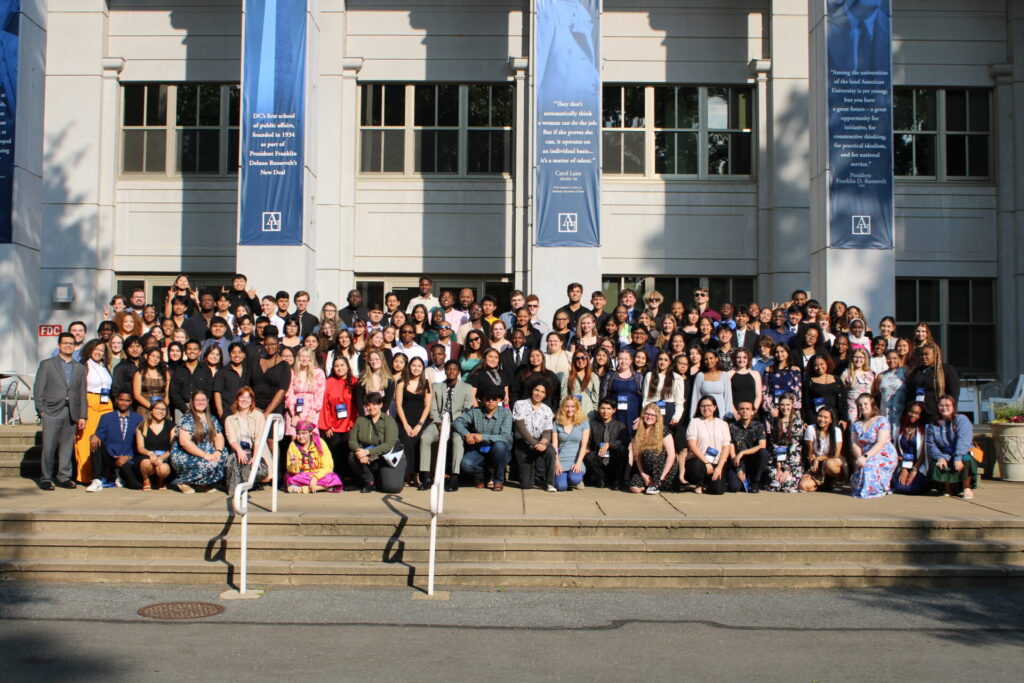
One hundred and thirty-nine high school TRIO students from across the country participated in the National Student Leadership Congress (NSLC) this year in Washington, D.C., from Saturday, June 11, until Thursday, June 15.
Storytelling, new friendships, and TRIO pride were on full display. The students—from low-income households and/or families where neither parent obtained a college degree—met Members of Congress and congressional staffers on Capitol Hill, took a tour of the National Mall and Smithsonian museums, and debated solutions to current societal issues.
Riley Handley, a rising junior at Lincoln County High School in West Virginia, flew for the first time. After arriving in D.C., the students traveled in counselor-led groups and settled at the American University campus, which served as the host institution for the experience.
Over the next few days, they followed a robust itinerary. They toured historical landmarks, met admissions officers at a selective college fair, and celebrated their cross-sectional identities as members of TRIO.
“People always mention that it is different working with students, but you never truly know what that means until you’re living it hands-on. And I could not have asked for a better experience,” said John Santana, an NSLC counselor and graduate candidate at East Stroudsburg University.
The beginning of the program was an expected geographic and culture shock for students, especially those who grew up with a rural background, Santana said. He highlighted the importance of an empathetic, albeit “tough” mentor in a student’s college access journey. One of his students was having trouble finding belonging in the new environment, and Santana credited the mental health and CPR training from COE for him being able to support that student.
Madison Bollin, who had just completed her sophomore year at the Kathlyn Joy Gilliam Collegiate Academy in Dallas, Texas, added that she wished there were more time for even more integration among the different student groups at the conference. She believes experiences like NSLC help educate students on every state’s unique challenges and education inequalities.
Beyond first-generation college students and low-income student-specific issues, the students tackled other polarizing topics through a mock congress, from book bans and religion in school to social media and climate change.
Bollin said listening to the presentations and student speakers catalyzed a curiosity for further research and understanding.
“For me, the prospect of going to college wasn’t an option before joining TRIO,” Boyer Valley senior Zayden Reffitt said. “I got to see many things I wouldn’t have even dreamed of seeing and maybe people I would never have met — this was a transforming journey that gives me a different outlook on the world around me.”
Despite being a rising high school senior, Reffitt has already accepted a spot at Iowa State University for agriculture education. His interest in agriculture started in his first year of high school when he joined his local chapter of the Future Farmers of America, an organization approaching challenges in agriculture and the environment from a youth perspective.
Unlike Reffitt, some are looking to attend college out of state.
Handley, who dreams about going to Yale or Columbia for psychology one day, took advantage of the college fair to speak with admissions officers about some of the programs at their institutions. However, her hometown’s lack of opportunities and resources, particularly for test preparation and college-level coursework, worries her.
She knows of only one person from her school’s history who went to an ivy league college and emphasized that potential and opportunity often walk hand in hand. She advocated for these issues during a conversation with Senator Shelley Moore Capito (R-WV) on the Hill, when she touched on the necessity of higher education access programs that identify students who would benefit from additional support most.
“Most people at my high school don’t usually go to college,” Handley continued, mentioning that she will be with Upward Bound this summer to improve her studies and standardized test scores. “And even just about the flying — it’s probably not that big of a deal to other people, but I’ve had that dream since I was a kid. It’s too expensive to fly for my family, but I could finally do that.”